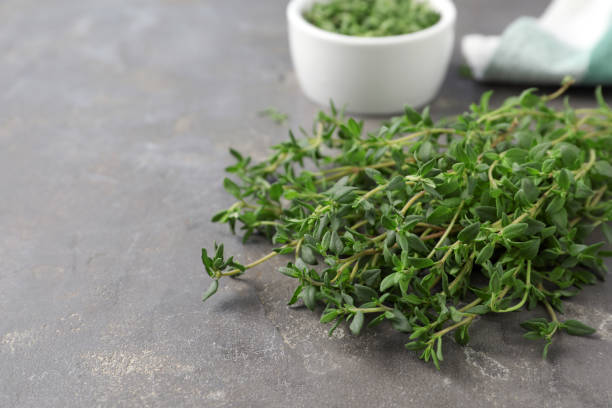Thyme is a herb that provides numerous benefits for the skin due to its essential vitamins and minerals. It contains vitamin C, a potent antioxidant that safeguards the skin. Thyme also has antibacterial and antifungal properties, soothes and calms irritated skin, and enhances the overall texture and tone of the skin, leaving it looking radiant and healthy.
Page Contents
Thyme OverviewHistorical Use
Thyme has been used for its medicinal and culinary properties since ancient times. Egyptians used it for embalming, Greeks as incense, Romans as a natural remedy, and Middle Ages for digestive issues.
Botanical Profile
Thyme is a perennial herb from the mint family. It has small fragrant leaves and white/pale pink flowers. The plant contains essential oils and flavonoids making it a powerful natural remedy for various health problems. It’s also beneficial for the skin due to its antibacterial and antifungal properties. Thyme can help tighten and tone the skin and contains essential vitamins and minerals like vitamin C and iron.
Primary Benefits for Skin
Thyme is an herb that has been used for centuries for its medicinal and culinary properties. It is also known for its benefits for the skin. This section will discuss the primary benefits of thyme for skin.
Antioxidant Properties
Thyme contains antioxidants that help protect the skin from damage caused by free radicals. Free radicals are unstable molecules that can damage cells and cause ageing. Thyme’s antioxidants help neutralize these free radicals, reducing the risk of premature ageing and improving overall skin health.
Antimicrobial Activity
Thyme has antimicrobial properties that can help fight against bacteria and fungi that can cause skin infections. This herb can be used topically to treat acne, eczema, and other skin conditions caused by bacteria or fungi. Thyme’s antimicrobial activity can also help prevent future breakouts and infections.
Anti-inflammatory Effects
Thyme has anti-inflammatory properties that can help reduce redness, swelling, and irritation on the skin. This herb can be used topically to soothe and calm irritated skin caused by conditions such as rosacea, psoriasis, and eczema. Thyme’s anti-inflammatory effects can also help prevent future flare-ups and promote overall skin health.
In conclusion, thyme has numerous benefits for the skin. Its antioxidant, antimicrobial, and anti-inflammatory properties make it a valuable ingredient in skin care products and a useful herb for treating various skin conditions.
Thyme in Skincare Products
Thyme is a herb that has been used for centuries for its medicinal properties. It is also an ingredient in skincare products due to its many benefits for the skin. It has antibacterial, anti-inflammatory, and antioxidant properties that make it a great addition to any skincare routine.
Cleansers and Toners
Thyme is often used in cleansers and toners due to its antibacterial properties. It helps to fight acne-causing bacteria and reduce inflammation. Thyme-infused cleansers and toners can also help to unclog pores and remove excess oil, leaving the skin feeling clean and refreshed.
Moisturizers and Creams
Thyme is also commonly found in moisturizers and creams due to its antioxidant properties. It helps to protect the skin from free radicals, which can cause premature ageing. Thyme-infused moisturizers and creams can also help to hydrate and soothe dry, irritated skin.
Serums and Masks
Thyme is a popular ingredient in serums and masks due to its anti-inflammatory properties. It helps to reduce redness and inflammation, making it an excellent choice for those with sensitive skin. Thyme-infused serums and masks can also help to brighten the skin and improve its overall texture.
In conclusion, thyme is a versatile herb that offers numerous benefits for the skin. Whether you have oily, dry, or sensitive skin, there is a thyme-infused skincare product that can help to improve its overall health and appearance.
Thyme Substitute
Thyme is a great herb for the skin, but it may not always be available or suitable for everyone. Fortunately, several thyme substitutes can be used to achieve similar benefits.
One such substitute is rosemary. Like thyme, rosemary is a fragrant herb that is rich in antioxidants and anti-inflammatory compounds. It also has antimicrobial properties that can help prevent acne and other skin infections. Rosemary can be used in various skincare products, such as toners, masks, and creams.
Another thyme substitute is oregano. Oregano is another herb that is rich in antioxidants and anti-inflammatory compounds. It also has antibacterial and antifungal properties that can help prevent skin infections. Oregano can be used in different skincare products, including soaps, scrubs, and serums.
Apart from herbs, several essential oils can be used in place of thyme. Tea tree oil, for example, is a popular essential oil that has antibacterial and antifungal properties. It is useful in treating acne, eczema, and other skin conditions. Lavender oil is another essential oil that is known for its calming and soothing properties. It can be used to treat dry, irritated, or inflamed skin.
Overall, while thyme is an excellent herb for the skin, several thyme substitutes can be used in a variety of skincare products. Rosemary, oregano, tea tree oil, and lavender oil are just a few examples of thyme substitutes that offer similar benefits.
Conclusion
Thyme is an herb that offers numerous benefits for the skin. It is rich in antioxidants, and anti-inflammatory and antimicrobial properties that help protect and repair the skin from damage caused by free radicals and other environmental stressors, as well as acne-causing bacteria and other skin infections.
Thyme is also a good source of essential vitamins and minerals that are necessary for healthy skin such as vitamin A and vitamin C. With its natural and gentle properties, thyme is a safe and effective alternative to harsh chemicals and synthetic ingredients commonly found in skincare products.



